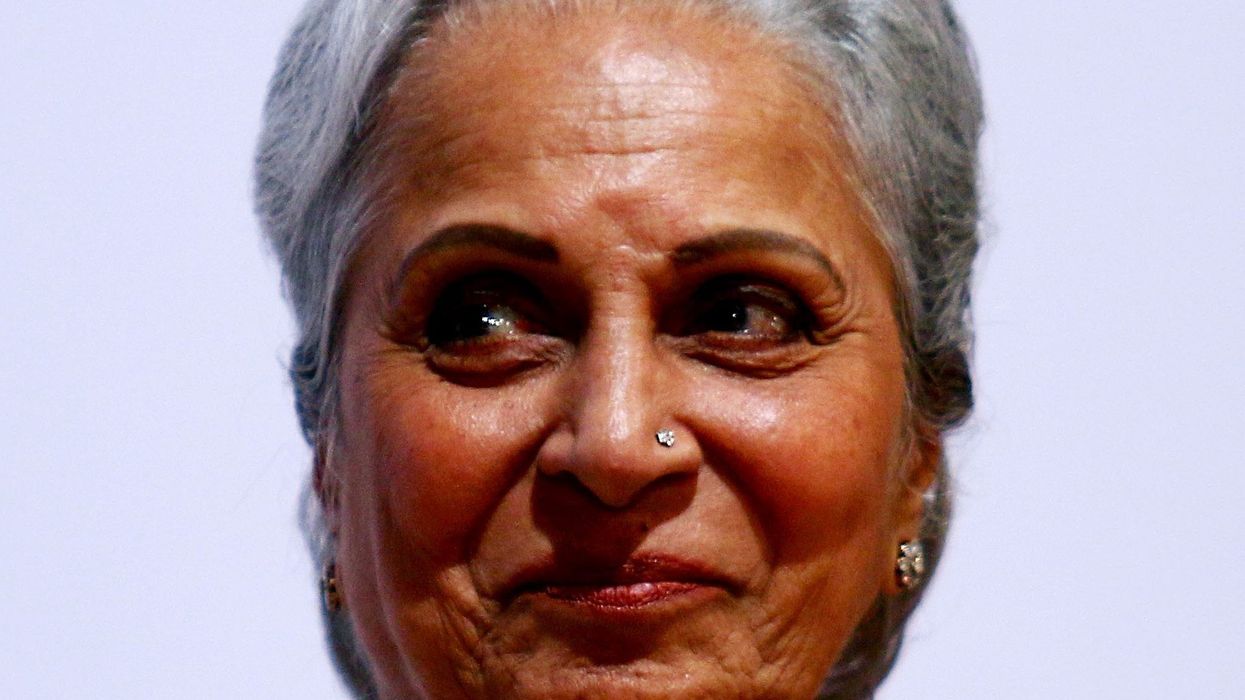Waheeda Rehman, who is considered one of the finest actresses of Hindi cinema, is set to receive this year’s Dadasaheb Phalke Lifetime Achievement Award. Rehman, 85, began her acting career in 1955 with Telugu films Rojulu Maraayi and Jayasimha, but it was her debut in Hindi with Dev Anand’s 1956 film CID that made her an overnight star. She then went on to star in a number of successful Hindi films, including Pyaasa, Guide, Kaagaz Ke Phool, Khamoshi, and Sahib Bibi Aur Gulam, to name a few.
As the veteran actress gears up to receive the prestigious Dadasaheb Phalke Lifetime Achievement Award, here is a look at some of her best films which helped establish her as one of the leading actresses of Hindi cinema.
Guide
Helmed by Vijay Anand, Guide sees Rahman in the role of Rosy, daughter of a courtesan. Her power-packed performance in the film helped the actress redefine her acting prowess. Critics and audiences loved her pairing with Dev Anand alike. Apart from great performances, Rahman’s impeccable dance moves in some of the film’s songs were major highlight of the film.
Kaagaz Ke Phool
Kaagaz Ke Phool, also starring Guru Datt, was a box-office failure upon its release in 1959. However, it went on to receive cult status several years after its release. The film centers on director Suresh Sinha who is enamoured by the beauty of a woman named Shanti and decides to cast him in his next film. Shanti becomes an overnight star following the huge success of the film, while Suresh’s career nosedives.
Pyaasa
Yet another gem of a film which bombed at the box-office but achieved cult status in years to come, Pyaasa revolves around an unsuccessful and idealistic poet Vijay (Guru Dutt) who receives help from Gulabo (Rahman), a golden-hearted prostitute, in getting his poetry published. Rehman delivers a career-defining performance in the film. Pyaasa was later remade in Telugu as Mallepoovu (1978).
Sahib Bibi Aur Gulam
Sahib Bibi Aur Gulam, which is based on Bimal Mitra’s Bengali-language novel Saheb Bibi Golam (1953), primarily focuses on characters played by Meena Kumari and Guru Dutt. However, Waheeda Rahman’s strong performance as Jabba did not go unnoticed. The film was chosen to represent India in the Best Foreign Language Film award at the 35th Academy Awards.
CID
A crime thriller directed by Raj Khosla and produced by Guru Dutt, CID launched Waheeda Rahman in Hindi films. She plays the supporting character of a moll named Kamini. Rahman impressed critics and audiences with her impeccable acting prowess and great screen presence and went on to receive several offers after the success of the film.
Neel Kamal
Directed by Ram Maheshwari, Neel Kamal is a romantic thriller starring Waheeda Rehman, Manoj Kumar, and Raaj Kumar in lead roles. Rehman won several awards and accolades for her performance as Sita whose sleepwalking takes her to the story of her past life. The film was a critical and commercial success upon its release in 1968.
Khamoshi
Khamoshi, based on the Bengali short story titled 'Nurse Mitra' by noted Bengali writer Ashutosh Mukherjee is a remake of Asit Sen's own Bengali film 'Deep Jwele Jaai'. The film was a box office hit at urban centres and was appreciated a lot for its cinematography. In the film, Waheeda Rehman's performance as a mentally and emotionally disturbed nurse ( Radha) is regarded as one of the best performances by the veteran actor.
Chaudhvin Ka Chand
A romantic drama, Chaudhvin Ka Chand, directed by Mohammed Sadiq, features Waheeda Rehman as Jameela, the epitome of grace and beauty. Set in Lucknow, the film revolves around the friendship and love between two friends (Guru Dutt and Rehman Khan) who fall for the same woman, and end up in an accidental love triangle. Waheeda’s ethereal presence adds depth to the film.
Teesari Kasam
Teesari Kasam is a portrayal of rural Indian society starring Raj Kapoor and Waheeda Rehman. It tells the story of Hiraman, a naive bullock cart driver who falls in love with Hirabai, a nautanki dancer. The film also addresses the issue of women's exploitation in the performing arts, particularly in travelling folk theatre.
Darpan
Waheeda played a prostitute who was rehabilitated by Sunil Dutt in 'Darpan,' a role he previously played for Vyjanthiamala in 'Sadhana.' But in this case, the sex worker was not a wailing poetess, and she was rejected by both the moral police in the screenplay and the audience watching the film.




